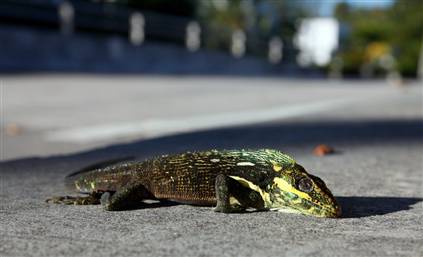
Across the so-called Sunshine State, oranges and strawberries are freezing, icicles are hanging off palm fronds, and iguanas paralyzed by the cold are falling out of trees.
Temperatures have plunged as low as the 20s in recent days, forcing people used to wearing flip-flops year-round to put on earmuffs.
"I am a warm-weather boy. There's no way I'm going out there," laughed Archie Adkins of Pensacola Beach as he pointed at bundled-up beachgoers.
And Floridians better bundle up: Flurries are forecast for the Panhandle on Thursday, and temperatures in the rest of the state are running at least 20 degrees below normal.
That prolonged freeze could also doom some of the nonnative iguanas that have called Florida home since being illegally introduced from South America by pet owners.
"It's almost like they go totally to sleep," Ron Magill of Miami Metrozoo told WPLG TV, referring to the fact that once temperatures drop into the 40s, iguanas shut down with very little blood flow and only their heart beating.
On Wednesday, many iguanas were spotted in "frozen" states, clinging from trees or stuck on the ground.
"Generally speaking, if it warms up afterwards, they can recover," Magill added, but a long cold snap can also kill iguanas.
Magill warned against trying to remove iguanas since they might quickly spring back to life.
"I knew of a gentleman who was collecting them off the street and throwing them in the back of his station wagon, and all of a sudden these things are coming alive, crawling on his back and almost caused a wreck," Magill said.
Other scenes from around frozen Florida on Wednesday:
'A white glow' under water
Every year on Jan. 6, the Greek Orthodox Church celebrates Epiphany. As part of the celebration in Tarpon Springs, a white cross is thrown into the Spring Bayou, and teenage boys dive in to retrieve it.
Finding the heavy wooden cross gives a teen a special blessing, which according to custom, will bring prosperity all year.
It was 38 degrees when the 66 teens dove in Wednesday. The water was 50 degrees on the surface.
With some 20,000 people looking on, the boys swam in a frenzy. Seventeen seconds later, 16-year-old Dimitri Kalogiannis retrieved the cross. Then came the hard part: getting out of the cold water into the colder air.
Dripping wet, Kalogiannis was hoisted onto the shoulders of his fellow teen divers. They carried him two blocks to the Greek Orthodox Church.
Still clutching the white cross - and shivering - Kalogiannis stood at the church's altar, barefoot and wet.
He grinned.
"When I was underwater, I saw a white glow. It just glowed," he said. "It wasn't as cold as I thought it would be."
'Nerve-wracking' effort to save oranges
Julie and John Arnold's 260-acre orange grove in the central Florida town of Clermont was filled with large icicles dangling from trees. And nearby canals were nearly a foot below average because of all the water the Arnolds and their neighbors have sprayed on crops to protect them.
They estimated about 10 percent of the Temple oranges on their land were lost, but that type of citrus is a small part of their total. Their other oranges were almost entirely intact.
The couple has been working around-the-clock for nearly two days to save their crops. Far colder weather has descended on their trees in the past, but the cold usually doesn't last so long.
"I've done a half-marathon before. This is much more nerve-wracking, much more exhausting," Julie said. "This is the ultimate endurance race."
State officials in Tallahassee were optimistic that crop damage was minimal but cautioned that it was too early to tell for sure.
"That's the $64,000 question," said Terence McElroy, spokesman for the Florida Department of Agriculture and Consumer Services. "The preliminary indications are that there has not been any catastrophic damage."
State officials were still urging farmers to take every measure possible because the hard freeze in some areas was expected to last for most of the week. Strawberry farmers also sprayed water on their crops for protection.
"There are precautions that can be taken, but in the final analysis, there's only so much you can do," McElroy said. "Mother Nature will have the last say."
Beach 'even if it's cold'
On Miami Beach, tourists wrapped in wool coats and hooded sweatshirts trolled the beach beneath a clear sky. Some let the water wash over their feet, and a few brave souls even lay out in bikinis and swimming shorts.
Arnold De Haan, visiting from Amsterdam, wore a bathing suit and sunglasses as he rested on a lounge chair beneath a blue cabana that shielded him from the wind. Next to him, his husband, Alex De Haan, put on suntan lotion.
A brisk wind blew, and temperatures hovered in the 50s.
"We're not going to be negatively influenced by the weather," Arnold De Haan said. "But next time, we'll be better prepared and take some warm clothes."
Many tourists bought extra sweatshirts and used the clothes they had set aside for the trip back home instead of the shorts and swimming suits they packed. Restaurant hostesses on Ocean Drive served warm drinks to customers in bulky coats sitting on outside patios.
Annie Parent rolled up her jeans and watched as her 3-year-old daughter, Olivia, played in the surf, stepping into the cool water dressed in a diaper and pink hooded sweatshirt.
"We went to Florida because we live in Quebec City, and there it's really cold," Parent said. "But here it's cold too."
Nonetheless, her daughter wanted to enjoy the sand.
"Florida for us is beach," Parent said. "Even if it's cold."



Reader Comments
to our Newsletter